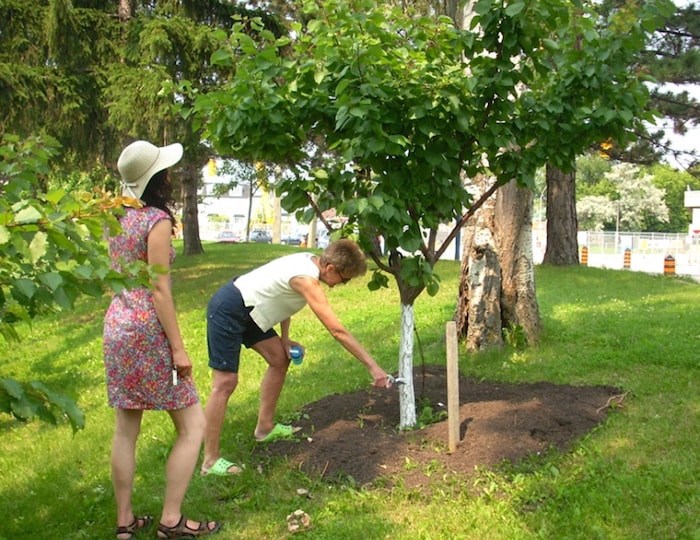Susan Poizner is a convert. She had no interest in gardening when her husband started a veggie garden in their backyard several years ago. As time passed, she became hooked and started looking beyond her fence to share the green gospel.
First, she established a workshop series in her neighbourhood, with fellow gardener Sherry Firing, to educate the community. Before long, the pair decided that they needed a project that this new group of gardeners could work on together. Ben Nobleman Park Community Orchard was born.
 Photo contributed
Photo contributed
Ben Nobleman Park Community Orchard is a small public orchard in Toronto’s west end that literally bears fruit for its community. Susan and Sherry host workshops for aspiring orchardists from all over the city. Susan also teaches live webinars and workshops around the city.
Poizner has spun this experience into the successful The Urban Forestry Radio Show and Podcast and a book titled Growing Urban Orchards: How to Care for Fruit Trees in the City and Beyond. It is a great guide for small orchardists in our climate.
And just about any gardener can become an orchardist.
Here are highlights from the book and recent podcasts:
Orchards have powerful community building potential
By gaining permission to plant in a public space, community members are treated to a rare sight in a city park: healthy, abundant fruit trees. These trees draw strangers together as volunteers work on the maintenance of the orchard and curious park-goers enjoy meaningful conversations about the orchard-park experience.
Anyone can garden
One of the most common objections we get from people who live in our ever-more crowded city is that they don’t have access to land for gardening. Poizner and Firing have proven that with a strong proposal, public space can be made available for passionate gardeners to share the wealth of their knowledge and bounty by creating community gardens and orchards in public spaces.
Some practical lessons:
Site selection is key to success
Fruit trees require a minimum 10 hours of sun per day, so make frequent visits to your potential site and take note of sunlight at different times of the day. Water for irrigation needs to be accessible during the first three years of a tree’s life.
Choosing the right tree
Start early to find your tree, as fruit trees are best planted in early spring and most garden centres don’t carry a large stock, so they are quickly picked over. Consider size, hardiness, and the type of fruit you want, but it is also important to consider cross-pollinating or self-pollinating trees. Peaches, apricots, and sour cherries are self-fruitful. All others need a mate. Apple trees can be cross pollinated by crab apple trees in the same neighbourhood.
As it is below, so it is above
To have a healthy fruit tree, you must have healthy roots. Poizner explains how to determine how much mulch (donut method, two to three inches thick and five inches from the trunk) and outlines precautions for protecting rootzones, such as keeping vehicle traffic away from the orchard.
A hole is not just a hole
Planting a tree seems like a simple enough endeavour in principle, but there are some important things to consider. Dig a hole large enough to accommodate all roots. Poizner advises against root pruning or allowing roots to circle the hole, as they will continue to do so after establishment and strangle the tree.
After planting, the work has just begun. Pruning, managing insect and disease and harvesting are also covered in the book. If you are feeling inspired and start thinking about spaces – public and private – where you might want to start your own orchard, we recommend that you pick up a copy of Poizner’s book and listen to her podcast.
Mark Cullen is an expert gardener, author, broadcaster, tree advocate and Member of the Order of Canada. His son Ben is a fourth-generation urban gardener and graduate of University of Guelph and Dalhousie University in Halifax. Follow them at markcullen.com, @markcullengardening, on Facebook and bi-weekly on Global TV’s National Morning Show.



